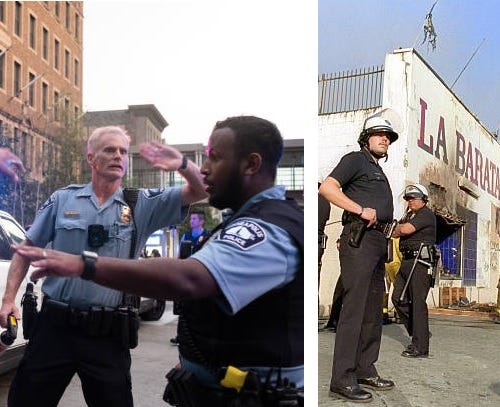
Minneapolis Police officers are getting some help navigating how to work under a consent decree after the murder of George Floyd. That support is coming from a place with deep experience with those issues: their counterparts in the Los Angeles Police Department.
Four LA officers were found not guilty of beating Rodney King Jr. in 1992. Former LAPD Chief Charlie Beck was on the force during the riots that erupted in that city after the verdict and the LAPD faced a consent decree at the time.
Beck's message?
"There is a way forward. LAPD recovered from that. It took us a decade," says Beck.
Minneapolis Police Commander Monica Hanson said the message was received well by rank and file, and that by-in-large, they are happy with Minneapolis Police Chief Brian O'Hara who also spoke at the event.
"When he even was speaking today, I got teary eyed," Hanson said. "Because this is what we've been wanting since 2020, was someone to be not behind us but in front of us. Saying these are great men and women who do this job day in and day out."
Michael Moore was also LAPD Chief from 2018 to 2024 and joined Beck in speaking to Minneapolis.
"A consent degree here is going to give them the necessary resources for the training, for the equipment, for the facilities, for the type of capabilities that's going to improve policing here," says Moore. "And to see that as that opportunity and rather than (something) to be fearful of."
For Moore and Beck, they were hoping to share helpful information with Minneapolis, which O'Hara says is exactly what it provided.
"It helps our officers get back to seeing things clearly, get back to their purpose, the, 'why' they're in this profession in the first place," O'Hara said. "Gives them some sense of pride."
There are differences and similarities with what happened in LA in 1992, and what happened in Minneapolis in 2020. Both involved police using what was deemed to be unnecessary force against a Black man. While King was beaten repeatedly during a traffic stop - and the officers in that case were acquitted - Floyd was accused by the MPD of passing a counterfeit bill at a south Minneapolis store. Former Minneapolis Police Officer Derek Chauvin, while arresting Floyd, kneeled on Floyd's neck for over nine minutes, eventually killing him.
Both the LA and Minneapolis instances were captured on video and leading to significant unrest in both cities. Those 1992 Los Angeles riots are still considered the largest and most destructive in U.S. history after those officers were found not guilty. The biggest difference between what happened in LA and what happened in Minneapolis is that Chauvin was found guilty and is in prison. Three other Minneapolis officers on the scene were also found guilty in separate cases.
Minneapolis is currently operating under both a state and federal consent decree following the murder of George Floyd nearly five years ago, and the ensuing riots and civil unrest that the city is still recovering from.
In 2023, the U.S. Department of Justice released a scathing report on the practices of the Minneapolis Police Department that found them using excessive force, unlawfully discriminating against Black and Native American people in enforcement activities, violating the rights of people engaged in protected speech, and discriminated against people with disabilities when responding to them in crisis.
Even while President Donald Trump's new Justice Department leadership has put a freeze on civil rights litigation, and suggested it may reconsider police reform agreements negotiated by the Biden administration, the City of Minneapolis has an existing consent decree with the State of Minnesota which would stay in place regardless of what new Attorney General Pam Bondi and the Trump administration decide to do with consent decrees.
O'Hara has said previously that no matter what the federal government decides to do, the framework for the consent decrees and work associated with implementing those changes is already happening, and many elements between the state and federal decrees are similar.
"We've had an implementation unit that was started already that's up and running, we've had dozens of community meetings around policies that have to be changed," he said. "These consent decrees add a whole lot more new work that did not exist in this organization before. And I think that's an opportunity for us to provide realistic, scenario-based adult learning that is appropriate, so that our officers have the skills that they need."
